No beating about the bush: First and foremost, Other Ocean’s downloadable minigame Dark Void Zero brings you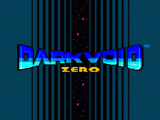 r inner AVGN to the fore, the game being above all a meticulous, studious replication (compared to a revision or a reimagination) of the features that often make older games so highly resistant to enjoyment, in turn rendering the game an easy target for naggish nitpicking.
r inner AVGN to the fore, the game being above all a meticulous, studious replication (compared to a revision or a reimagination) of the features that often make older games so highly resistant to enjoyment, in turn rendering the game an easy target for naggish nitpicking.
Before its release, the PC and DSiWare title created a minor stir in the games press with its cleverly orchestrated marketing campaign, one that laid out for the game lavish faux origins, as Capcom claimed the game had started off as an ’80s Mega Man clone “locked away for decades.” All this served, of course, to drum up more publicity for its mothership, the triple-A Dark Void, which unfortunately flopped creatively and commercially, perhaps undeservedly banishing Dark Void Zero to the kind of, uh, dark void of infamy that its fictional trappings prophesied for it in the first place.
Indeed, Mega Man is the most evident point of comparison together with the first Metroid, though Dark Void Zero does replace Samus’ ball form for a jetpack, and allows players to shoot into eight(!) directions. Make no mistake, though, these features do not exist simply to make your life easier. In the game, you play as Rusty, a test-pilot sent into the Void, a galactic no man’s land between Earth and the homeworld of an alien threat known as the Watchers. These beings are ominously making their way to Earth by means of a series of portals, and it’s up to the player, with the aid of the great scientist Nikola Tesla, to gain control of these portals and put an end to the menace.
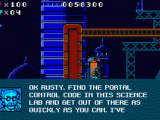 Dark Void Zero goes above and beyond in staying true to its eighties influences. This is evident chiefly in two major ways, the first being its level of difficulty, which comes in beautiful blacks, reds and blues - the hues of an ass-whooping, of course. With this I refer the very deliberate slipping of the player into molten rock articulated in a highly inaccurate, block-based projectile collision detection and exacerbated by a complex two-mode jetpack. The game also extends its sadistic tendencies to text boxes (see on the right) and alerts, which cover from a quarter to an entire third of screen estate, forcing you to slowly skip through information and wait for alerts to pass – or face the potential consequences of slipping into a pool of lava hidden under the box.
Dark Void Zero goes above and beyond in staying true to its eighties influences. This is evident chiefly in two major ways, the first being its level of difficulty, which comes in beautiful blacks, reds and blues - the hues of an ass-whooping, of course. With this I refer the very deliberate slipping of the player into molten rock articulated in a highly inaccurate, block-based projectile collision detection and exacerbated by a complex two-mode jetpack. The game also extends its sadistic tendencies to text boxes (see on the right) and alerts, which cover from a quarter to an entire third of screen estate, forcing you to slowly skip through information and wait for alerts to pass – or face the potential consequences of slipping into a pool of lava hidden under the box.
As you make headway, fighting through the controls, the collision detection, the alert boxes and the overall difficulty, you’ll eventually come face to face with the very first boss. More than likely, you’ll be on your very last legs, only narrowly edging out the Watcher beast and discovering in the subsequent level that Other Ocean have blessed you with a continue! But make no mistake, this is no ordinary continue, this is your grandfather’s continue had video games existed in the roaring twenties: Instead of awarding you a full set of lives, the game is content with handing out the exact amount of lives in your possession at the time of saving. In other words, to actually benefit from the continue, which is thus more of a save feature, you need to be able to hold on to your lives – otherwise, it’s simply easier to restart and replay the entire game… the tip, the point of this highly barbaric design, of course!
(more…)
Read More

 Terry Cavanagh‘s seminal platformer VVVVVV dropped last January, and I gave a
Terry Cavanagh‘s seminal platformer VVVVVV dropped last January, and I gave a 


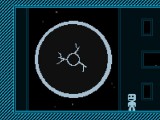
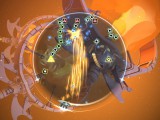



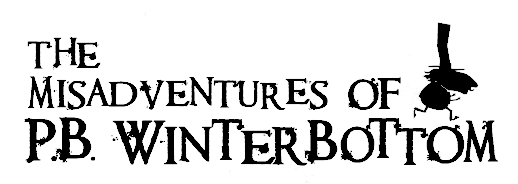 Did I yet mention pie, the strangest of McGuffins? There exists so much pie in the world of P.B., in fact, that it quite possibly takes the cake of having the most pie in a video game ever. Even the primary villain - a massive magical pie that has eluded P.B. W.B. and ultimately led him to his ponderous predicament - counts for this quota! It is fitting, then, that the game has been rendered with plenty of piety (as you could hopefully gather from my description above), going further than most in its reappropriation of its influences, like the silent filmic era, by using as condiments for instance title cards for explicating plot and having pun-filled subtitles for level names.
Did I yet mention pie, the strangest of McGuffins? There exists so much pie in the world of P.B., in fact, that it quite possibly takes the cake of having the most pie in a video game ever. Even the primary villain - a massive magical pie that has eluded P.B. W.B. and ultimately led him to his ponderous predicament - counts for this quota! It is fitting, then, that the game has been rendered with plenty of piety (as you could hopefully gather from my description above), going further than most in its reappropriation of its influences, like the silent filmic era, by using as condiments for instance title cards for explicating plot and having pun-filled subtitles for level names.